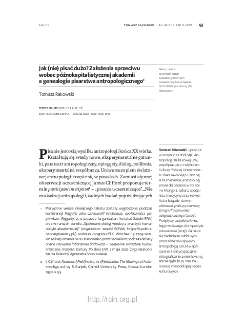
Object
Title: Jak (nie) pisać dużo? Założenia sprzeciwu wobec późnokapitalistycznej akademii a genealogie pisarstwa antropologicznego
Subtitle:
Publisher:
Place of publishing:
Description:
21 cm ; Pol. text, eng. summary
References:
1. Barth, F., Nomads of South Persia. The Basseri Tribe of the Khamseh Confederacy. Oslo: Oslo University Press, 1986 [1961].
2. Behar, R., Read More, Write Less. w: Writing Anthropology. Essays on Craft and Commitment, red. C. McGranahan, Durham, Duke University Press, 2020, s. 47-53.
![]()
3. Bertelsen, B., Composing texts and the composition of uprisings: Notes on writing the postcolonial political, w: The Composition of Anthropology. How Anthropological Texts Are Written, red. M. Nielsen. N. Rapport, London, Routledge, 2017.
4. Burridge, K., Someone, No One, Princeton, Princeton University Press,1979.
5. Clifford J., Notes on (Field) Notes, w: (Field)notes. The Makings of Anthropology, red. R. Sanjek, Ithaca and London: Cornell University Press, 1990.
6. Ingold, T., That’s enough about ethnography!, w “HAU: Journal of Ethnographic Theory”, 2014, 1 (4), s. 383–395.
![]()
7. Lien, M.E., Palsson, G. Ethnography Beyond the Human: The „other-than-human” in ethnographic work, “Ethnos. Journal of Anthropology”, 2021, 86 (1), s. 1-20.
![]()
8. Klekot, E., Flying Kites Workshop, na podstawie tekstów Tima Ingolda, 2nd Colleex Workshop, EASA, Cieszyn, lipiec 2019.
9. Kuschnir, K., Ethnographic Drawing. Eleven Benefits of Using a Sketchbook for Fieldwork, “Visual Ethnography”, 2016, 1 (5), s. 103-134.
10. Nielsen. M. Rapport, N. On the Genealogy of Writing Anthropology, w: The Composition of Anthropology. How Anthropological Texts Are Written, red. M. Nielsen. N. Rapport, London, Routledge, 2018.
11. Nielsen, M., Rapport, N., The Composition of Anthropology. How Anthropological Texts Are Written, red. M. Nielsen. N. Rapport, London, Routledge, 2018.
12. Rapport, N., Człowiek nieprzypisany, jakikolwiek, Anyone. O uznanie podmiotu postkulturowego i kosmopolitycznego, przeł. T. Rakowski, J. S. Wasilewski, w: Colloquia Anthropologica, red. M. Buchowski, A. Bentkowski, Warszawa, WAiP, 2013.
13. Silvia, P. J., How to write a lot ? A Practical Guide to Productive Academic Writing, Washington, Apa Life Tools, 2007.
14. Sobaszek. W., Spiski życiowe, Dziennik węgajcki 1982-2020, Węgajty, Stowarzyszenie Węgajty, b.d.
15. Starakiewicz, M., (rys. J. Woynarowski), Model i metafora. Komunikacja wizualna w humanistyce, Kraków, Wyd. Ha!art, 2019.
16. Taussig, M., I swear I saw this. Drawings in Fieldwork Notebooks, Namely My Own. Chicago, Chicago University Press, 2011.
![]()
17. Tyler, S., Post-Modern Ethnography. From Document of the Occult to Occult Document, w: Writing Culture. The Poetic and Politics of Ethnography, red. J. Clifford, G. Marcus, Berkeley and Los Angeles, California: University of California Press, 1986.
![]()
Relation:
Issue:
Start page:
End page:
Detailed Resource Type:
Resource Identifier:
oai:rcin.org.pl:238776 ; 0867-0633 ; 10.18318/td.2023.1.3
Source:
IBL PAN, call no. P.I.2524 ; click here to follow the link
Language:
Language of abstract:
Rights:
Terms of use:
Copyright-protected material. May be used within the limits of statutory user freedoms
Digitizing institution:
Institute of Literary Research of the Polish Academy of Sciences
Original in:
Library of the Institute of Literary Research PAS
Projects co-financed by:
European Union. European Regional Development Fund ; Operational Program Digital Poland, 2014-2020, Measure 2.3: Digital accessibility and usefulness of public sector information; funds from the European Regional Development Fund and national co-financing from the state budget.
Access:
Object collections:
Last modified:
Jan 29, 2024
In our library since:
Jun 26, 2023
Number of object content downloads / hits:
83
All available object's versions:
https://rcin.org.pl/ibl/publication/275084
Show description in RDF format:
Show description in RDFa format:
Show description in OAI-PMH format:
Objects Similar
Kopczyński, Andrzej Onufry (1735–1817)
Kamiński, Jan Nepomucen (1777–1855) Czarnik, Bronisław (1858–1918) Zakład Narodowy im. Ossolińskich.

 INSTYTUT ARCHEOLOGII I ETNOLOGII POLSKIEJ AKADEMII NAUK
INSTYTUT ARCHEOLOGII I ETNOLOGII POLSKIEJ AKADEMII NAUK
 INSTYTUT BADAŃ LITERACKICH POLSKIEJ AKADEMII NAUK
INSTYTUT BADAŃ LITERACKICH POLSKIEJ AKADEMII NAUK
 INSTYTUT BADAWCZY LEŚNICTWA
INSTYTUT BADAWCZY LEŚNICTWA
 INSTYTUT BIOLOGII DOŚWIADCZALNEJ IM. MARCELEGO NENCKIEGO POLSKIEJ AKADEMII NAUK
INSTYTUT BIOLOGII DOŚWIADCZALNEJ IM. MARCELEGO NENCKIEGO POLSKIEJ AKADEMII NAUK
 INSTYTUT BIOLOGII SSAKÓW POLSKIEJ AKADEMII NAUK
INSTYTUT BIOLOGII SSAKÓW POLSKIEJ AKADEMII NAUK
 INSTYTUT CHEMII FIZYCZNEJ PAN
INSTYTUT CHEMII FIZYCZNEJ PAN
 INSTYTUT CHEMII ORGANICZNEJ PAN
INSTYTUT CHEMII ORGANICZNEJ PAN
 INSTYTUT FILOZOFII I SOCJOLOGII PAN
INSTYTUT FILOZOFII I SOCJOLOGII PAN
 INSTYTUT GEOGRAFII I PRZESTRZENNEGO ZAGOSPODAROWANIA PAN
INSTYTUT GEOGRAFII I PRZESTRZENNEGO ZAGOSPODAROWANIA PAN
 INSTYTUT HISTORII im. TADEUSZA MANTEUFFLA POLSKIEJ AKADEMII NAUK
INSTYTUT HISTORII im. TADEUSZA MANTEUFFLA POLSKIEJ AKADEMII NAUK
 INSTYTUT JĘZYKA POLSKIEGO POLSKIEJ AKADEMII NAUK
INSTYTUT JĘZYKA POLSKIEGO POLSKIEJ AKADEMII NAUK
 INSTYTUT MATEMATYCZNY PAN
INSTYTUT MATEMATYCZNY PAN
 INSTYTUT MEDYCYNY DOŚWIADCZALNEJ I KLINICZNEJ IM.MIROSŁAWA MOSSAKOWSKIEGO POLSKIEJ AKADEMII NAUK
INSTYTUT MEDYCYNY DOŚWIADCZALNEJ I KLINICZNEJ IM.MIROSŁAWA MOSSAKOWSKIEGO POLSKIEJ AKADEMII NAUK
 INSTYTUT PODSTAWOWYCH PROBLEMÓW TECHNIKI PAN
INSTYTUT PODSTAWOWYCH PROBLEMÓW TECHNIKI PAN
 INSTYTUT SLAWISTYKI PAN
INSTYTUT SLAWISTYKI PAN
 SIEĆ BADAWCZA ŁUKASIEWICZ - INSTYTUT TECHNOLOGII MATERIAŁÓW ELEKTRONICZNYCH
SIEĆ BADAWCZA ŁUKASIEWICZ - INSTYTUT TECHNOLOGII MATERIAŁÓW ELEKTRONICZNYCH
 MUZEUM I INSTYTUT ZOOLOGII POLSKIEJ AKADEMII NAUK
MUZEUM I INSTYTUT ZOOLOGII POLSKIEJ AKADEMII NAUK
 INSTYTUT BADAŃ SYSTEMOWYCH PAN
INSTYTUT BADAŃ SYSTEMOWYCH PAN
 INSTYTUT BOTANIKI IM. WŁADYSŁAWA SZAFERA POLSKIEJ AKADEMII NAUK
INSTYTUT BOTANIKI IM. WŁADYSŁAWA SZAFERA POLSKIEJ AKADEMII NAUK
































